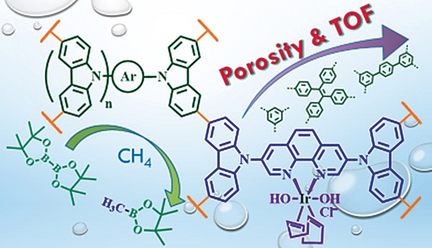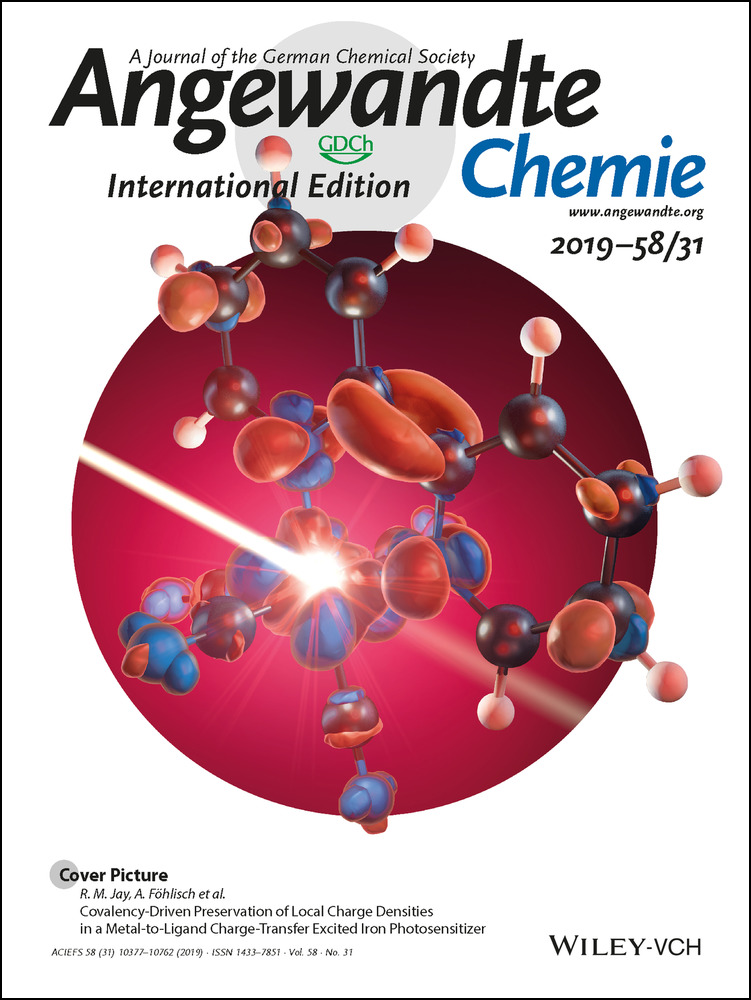Efficient and Selective Methane Borylation Through Pore Size Tuning of Hybrid Porous Organic-Polymer-Based Iridium Catalysts
Dr. Qi Chen
State Key Laboratory of Marine Resource Utilization in South China Sea, Hainan University, Haikou, 570228 P. R. China
These authors contributed equally to this work.
Search for more papers by this authorAnwang Dong
State Key Laboratory of Marine Resource Utilization in South China Sea, Hainan University, Haikou, 570228 P. R. China
These authors contributed equally to this work.
Search for more papers by this authorDongxu Wang
State Key Laboratory of Marine Resource Utilization in South China Sea, Hainan University, Haikou, 570228 P. R. China
Search for more papers by this authorLu Qiu
State Key Laboratory of Marine Resource Utilization in South China Sea, Hainan University, Haikou, 570228 P. R. China
Search for more papers by this authorDr. Chunxin Ma
State Key Laboratory of Marine Resource Utilization in South China Sea, Hainan University, Haikou, 570228 P. R. China
Search for more papers by this authorDr. Yihui Yuan
State Key Laboratory of Marine Resource Utilization in South China Sea, Hainan University, Haikou, 570228 P. R. China
Search for more papers by this authorProf. Dr. Yunpeng Zhao
State Key Laboratory of Coastal and Offshore Engineering, Dalian University of Technology, Dalian, 116024 P. R. China
Search for more papers by this authorProf. Dr. Na Jia
Petroleum Systems Engineering, Faculty of Engineering and Applied Science, University of Regina, Regina, Saskatchewan, S4S 0A2 Canada
Search for more papers by this authorProf. Dr. Zhanhu Guo
Integrated Composites Laboratory (ICL), Department of Chemical & Biomolecular Engineering, University of Tennessee, Knoxville, TN, 37996 USA
College of Chemical and Environmental Engineering, Shandong University of Science and Technology, Qingdao, 266590 P. R. China
Search for more papers by this authorCorresponding Author
Prof. Dr. Ning Wang
State Key Laboratory of Marine Resource Utilization in South China Sea, Hainan University, Haikou, 570228 P. R. China
Search for more papers by this authorDr. Qi Chen
State Key Laboratory of Marine Resource Utilization in South China Sea, Hainan University, Haikou, 570228 P. R. China
These authors contributed equally to this work.
Search for more papers by this authorAnwang Dong
State Key Laboratory of Marine Resource Utilization in South China Sea, Hainan University, Haikou, 570228 P. R. China
These authors contributed equally to this work.
Search for more papers by this authorDongxu Wang
State Key Laboratory of Marine Resource Utilization in South China Sea, Hainan University, Haikou, 570228 P. R. China
Search for more papers by this authorLu Qiu
State Key Laboratory of Marine Resource Utilization in South China Sea, Hainan University, Haikou, 570228 P. R. China
Search for more papers by this authorDr. Chunxin Ma
State Key Laboratory of Marine Resource Utilization in South China Sea, Hainan University, Haikou, 570228 P. R. China
Search for more papers by this authorDr. Yihui Yuan
State Key Laboratory of Marine Resource Utilization in South China Sea, Hainan University, Haikou, 570228 P. R. China
Search for more papers by this authorProf. Dr. Yunpeng Zhao
State Key Laboratory of Coastal and Offshore Engineering, Dalian University of Technology, Dalian, 116024 P. R. China
Search for more papers by this authorProf. Dr. Na Jia
Petroleum Systems Engineering, Faculty of Engineering and Applied Science, University of Regina, Regina, Saskatchewan, S4S 0A2 Canada
Search for more papers by this authorProf. Dr. Zhanhu Guo
Integrated Composites Laboratory (ICL), Department of Chemical & Biomolecular Engineering, University of Tennessee, Knoxville, TN, 37996 USA
College of Chemical and Environmental Engineering, Shandong University of Science and Technology, Qingdao, 266590 P. R. China
Search for more papers by this authorCorresponding Author
Prof. Dr. Ning Wang
State Key Laboratory of Marine Resource Utilization in South China Sea, Hainan University, Haikou, 570228 P. R. China
Search for more papers by this authorGraphical Abstract
Pore patrol: A series of heterogenous catalysts based on iridium complexes bound inside porous polycarbazoles was prepared for the selective monoborylation of methane. Catalysts with high efficiency and good chemoselectivity can be developed through tuning the pore size distribution of the porous polycarbazole.
Abstract
As a new energy source that could replace petroleum, the global reserves of methane hydrate (combustible ice) are estimated to be approximately 20 000 trillion cubic meters. A large amount of methane hydrate has been found under the seabed, but the transportation and storage of methane gas far from coastlines are technically unfeasible and expensive. The direct conversion of methane into value-added chemicals and liquid fuels is highly desirable but remains challenging. Herein, we prepare a series of iridium complexes based on porous polycarbazoles with high specific areas and good thermochemical stabilities. Through structure tuning we optimized their catalytic activities for the selective monoborylation of methane. One of these catalysts (CAL-3-Ir) can produce methyl boronic acid pinacol ester (CH3Bpin) in 29 % yield in 9 h with a turnover frequency (TOF) of approximately 14 h−1. Because its pore sizes favor monoborylated products, it has a high chemoselectivity for monoborylation (CH3Bpin:CH2(Bpin)2=16:1).
Supporting Information
As a service to our authors and readers, this journal provides supporting information supplied by the authors. Such materials are peer reviewed and may be re-organized for online delivery, but are not copy-edited or typeset. Technical support issues arising from supporting information (other than missing files) should be addressed to the authors.
| Filename | Description |
|---|---|
| anie201906350-sup-0001-misc_information.pdf2.3 MB | Supplementary |
Please note: The publisher is not responsible for the content or functionality of any supporting information supplied by the authors. Any queries (other than missing content) should be directed to the corresponding author for the article.
References
- 1A. Hu, J. Guo, H. Pan, Z. Zuo, Science 2018, 361, 668–672.
- 2A. Caballero, P. J. Pérez, Chem. Soc. Rev. 2013, 42, 8809–8820.
- 3S. Lu, Renewable Sustainable Energy Rev. 2015, 41, 884–900.
- 4J. Feng, Y. Wang, X. Li, Appl. Energy 2018, 211, 1171–1178.
- 5E. D. Sloan, Jr., Nature 2003, 426, 353–359.
- 6S. Xie, S. Lin, Q. Zhang, Z. Tian, Y. Wang, J. Energy Chem. 2018, 27, 1629–1636.
- 7J. Kim, A. Maiti, L. Lin, J. K. Stolaroff, B. Smit, R. D. Aines, Nat. Commun. 2013, 4, 1694.
- 8M. Ravi, M. Ranocchiari, J. A. Bokhoven, Angew. Chem. Int. Ed. 2017, 56, 16464–16483; Angew. Chem. 2017, 129, 16684–16704.
- 9W. Taifan, J. Baltrusaitis, Appl. Catal. B 2016, 198, 525–547.
- 10P. Schwach, X. Pan, X. Bao, Chem. Rev. 2017, 117, 8497–8520.
- 11E. McFarland, Science 2012, 338, 341–342.
- 12P. Tang, Q. Zhu, Z. Wu, D. Ma, Energy Environ. Sci. 2014, 7, 2580–2591.
- 13Y. Kwon, T. Y. Kim, G. Kwon, J. Yi, H. Lee, J. Am. Chem. Soc. 2017, 139, 17694–17699.
- 14N. J. Gunsalus, A. Koppaka, S. H. Park, S. M. Bischof, B. G. Hashiguchi, R. A. Periana, Chem. Rev. 2017, 117, 8521–8573.
- 15R. A. Periana, D. J. Taube, S. Gamble, H. Taube, T. Satoh, H. Fujii, Science 1998, 280, 560–564.
- 16W. Huang, S. Zhang, Y. Tang, Y. Li, L. Nguyen, Y. Li, J. Shan, D. Xiao, R. Gagne, A. I. Frenkel, F. Tao, Angew. Chem. Int. Ed. 2016, 55, 13441–13445; Angew. Chem. 2016, 128, 13639–13643.
- 17J. Huang, W. Liu, Y. Yang, B. Liu, ACS Catal. 2018, 8, 1748–1756.
- 18V. L. Sushkevich, D. Palagin, M. Ranocchiari, J. A. van Bokhoven, Science 2017, 356, 523–527.
- 19Y. Tang, Y. Li, V. Fung, D. Jiang, W. Huang, S. Zhang, Y. Iwasawa, T. Sakata, L. Nguyen, X. Zhang, A. I. Frenkel, F. Tao, Nat. Commun. 2018, 9, 1321.
- 20M. Lin, A. Sen, Nature 1994, 368, 613–615.
- 21H. D. Gesser, N. R. Hunter, Chem. Rev. 1985, 85, 235–244.
- 22J. Xie, R. Jin, A. Li, Y. Bi, Q. Ruan, Y. Deng, Y. Zhang, S. Yao, G. Sankar, D. Ma, J. Tang, Nat. Catal. 2018, 1, 889.
- 23H. Schwarz, Angew. Chem. Int. Ed. 2011, 50, 10096–10115; Angew. Chem. 2011, 123, 10276–10297.
- 24R. A. Periana, O. Mironov, D. Taube, G. Bhalla, C. Jones, Science 2003, 301, 814–818.
- 25K. T. Smith, S. Berritt, M. González-Moreiras, S. Ahn, M. R. Smith III, M. H. Baik, D. J. Mindiola, Science 2016, 351, 1424–1427.
- 26A. K. Cook, S. D. Schimler, A. J. Matzger, M. S. Sanford, Science 2016, 351, 1421–1424.
- 27S. Ahn, D. Sorsche, S. Berritt, M. R. Gau, D. J. Mindiola, M. H. Baik, ACS Catal. 2018, 8, 10021–10031.
- 28X. Zhang, Z. Huang, M. Ferrandon, D. Yang, L. Robison, P. Li, T. C. Wang, M. Delferro, O. K. Farha, Nat. Catal. 2018, 1, 356.
- 29Y. Xu, S. Jin, H. Xu, A. Nagai, D. Jiang, Chem. Soc. Rev. 2013, 42, 8012–8031.
- 30S. Das, P. Heasman, T. Ben, S. Qiu, Chem. Rev. 2017, 117, 1515–1563.
- 31L. Tan, B. Tan, Chem. Soc. Rev. 2017, 46, 3322–3356.
- 32Q. Chen, B. Han, Macromol. Rapid Commun. 2018, 39, 1800040.
- 33X. Feng, X. Ding, D. Jiang, Chem. Soc. Rev. 2012, 41, 6010–6022.
- 34
- 34aA. Kayan, Adv. Compos. Hybrid Mater. 2019, 2, 34–45;
- 34bS. Jie, W. Yulei, Q. Jun, ES Mater. Manuf. 2018, 3, 29–37.
- 35
- 35aC. Zhai, H. Yin, A. Wang, J. Li, Eng. Sci. 2018, 3, 84–88;
10.30919/es8d738 Google Scholar
- 35bL. Liu, P. Bernazzani, W. Chu, S. Luo, B. Wang, Z. Guo, Eng. Sci. 2018, 2, 74–81.
10.30919/es8d637 Google Scholar
- 36H. Suzuki, T. Kanbara, T. Yamamoto, Inorg. Chim. Acta 2004, 357, 4335–4340.
- 37F. A. Cotton, P. Lahuerta, M. Sanau, W. Schwotzer, Inorg. Chim. Acta 1986, 120, 153–157.
- 38
- 38aH. Liang, A. Acharjya, D. A. Anito, S. Vogl, T. Wang, A. Thomas, B. Han, ACS Catal. 2019, 9, 3959–3968;
- 38bH. Liang, Q. Chen, B. Han, ACS Catal. 2018, 8, 5313–5322.
- 39X. Zhu, S. M. Mahurin, S. An, C.-L. Do-Thanh, C. Tian, Y. Li, L. W. Gill, E. W. Hagaman, Z. Bian, J. Zhou, Chem. Commun. 2014, 50, 7933–7963.
- 40Q. Chen, D. Liu, J. Zhu, B. Han, Macromolecules 2014, 47, 5926–5931.
- 41Q. Chen, M. Luo, P. Hammershøj, D. Zhou, Y. Han, B. W. Laursen, C. Yan, B. Han, J. Am. Chem. Soc. 2012, 134, 6084–6087.
- 42Q. Chen, D. Liu, M. Luo, L. Feng, Y. Zhao, B. Han, Small 2014, 10, 308–315.
- 43J. Zhu, Q. Chen, Z. Sui, L. Pan, J. Yu, J. Mater. Chem. A 2014, 2, 16181–16189.
- 44L. Jürgensen, M. Frank, M. Pyeon, L. Czympiel, S. Mathur, Organometallics 2017, 36, 2331–2337.
- 45M. F. N. Carvalho, M. T. Duarte, T. A. Fernandes, A. M. Galvao, A. M. Botelho do Rego, Inorg. Chem. 2010, 49, 10330–10337.
- 46K. Wang, L. Yang, X. Wang, L. Guo, G. Cheng, C. Zhang, S. Jin, B. Tan, A. Cooper, Angew. Chem. Int. Ed. 2017, 56, 14149–14153; Angew. Chem. 2017, 129, 14337–14341.
- 47C. Zhang, Z. Wang, L. Tan, T. Zhai, S. Wang, B. Tan, Y. Zheng, X. Yang, H. Xu, Angew. Chem. Int. Ed. 2015, 54, 9244–9248; Angew. Chem. 2015, 127, 9376–9380.
- 48H. Xu, J. Gao, D. Jiang, Nat. Chem. 2015, 7, 905–912.
- 49S. Ding, W. Wang, Chem. Soc. Rev. 2013, 42, 548–568.
- 50J. Wu, F. Xu, S. Li, P. Ma, X. Zhang, Q. Liu, R. Fu, D. Wu, Adv. Mater. 2019, 31, 1802922.
- 51J. Jiang, C. Wang, A. Laybourn, T. Hasell, R. Clowes, Y. Z. Khimyak, J. Xiao, S. J. Higgins, D. J. Adams, A. I. Cooper, Angew. Chem. Int. Ed. 2011, 50, 1072–1075; Angew. Chem. 2011, 123, 1104–1107.
- 52K. Wu, J. Guo, C. Wang, Angew. Chem. Int. Ed. 2016, 55, 6013–6017; Angew. Chem. 2016, 128, 6117–6121.





